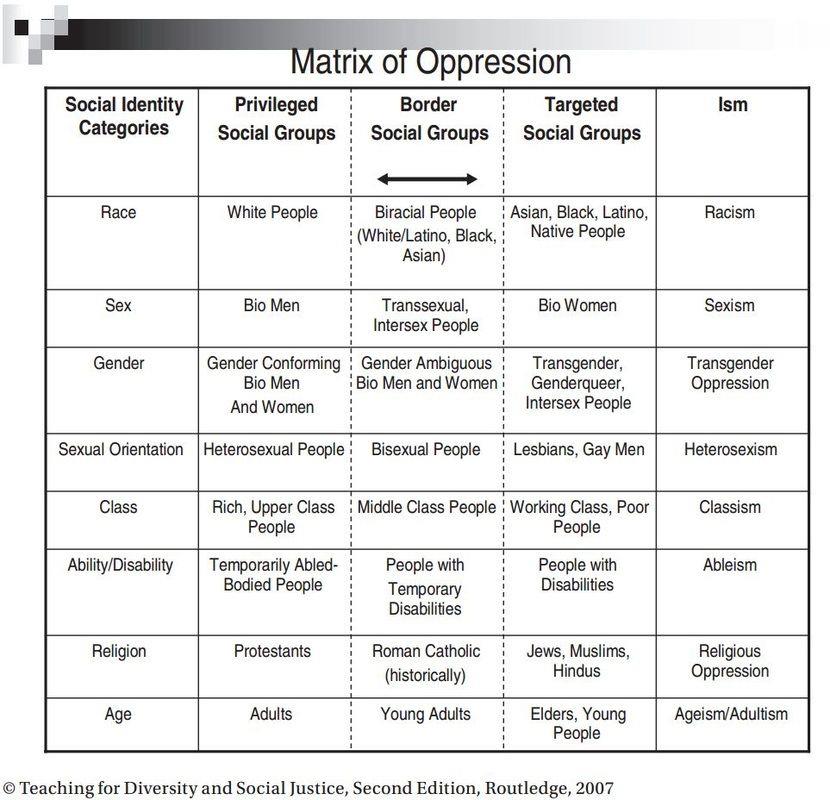The world-wide rise of Intersectional Feminism, sometimes referred to as the third-wave of feminism, which follows the first during the 19th and early 20th centuries, and the second in the 1960s-80s, brought a different message from the original civil rights movements.
The fight for gender equality moved from the perspective of individually equal legal rights and opportunities - which, from a legal point of view, was achieved when no one was given or refused rights on account of their identity - to identity-based, collectively equal social rights and outcomes where legal rights must be applied equitably to achieve equality in society.
Intersectionality, along with its adjoining terminology - with words such as inclusivity, diversity, and gender/race/etcetera equity amongst others - has, to a great extent, marketed and benevolently cemented its place as the only publicly acceptable ideology to follow when dealing with social and economic issues by politicians, academics, activists, and public figures alike.
Power and Oppression
The origins of Intersectionality, or 'Cultural Marxism' as some scholars have labelled it, comes from the Frankfurt School of Economics which started out as a Marxist economic think-tank, but eventually shifted towards more sociological issues.
Essentially, it applied Marx-like rhetoric to non-economic class struggles where a class of people has either perceived or real power over others.
This means that both Intersectionality and Marxism deal with power and oppression, although they are manifested in different contexts. Marxism primarily deals with class struggle - meaning that there is a constant power struggle between the working class and the ruling class, and that the socio-economic advantages that the ruling class is perceived to have enables them to oppress the working class for their labour.
Intersectionality basically deals with identity struggle, meaning that there is a constant power struggle between varying identities (race, gender, etc), and that the privileges that ruling identities are perceived to have enables them to oppress the non-privileged identities.
 The obvious issue with this perceived identity struggle of power and oppression is that it makes the assumption that every single individual in a particular identity group is born with the same degree of privilege, and that every single individual from an identity group with less perceived privilege is, de facto, less privileged.
The obvious issue with this perceived identity struggle of power and oppression is that it makes the assumption that every single individual in a particular identity group is born with the same degree of privilege, and that every single individual from an identity group with less perceived privilege is, de facto, less privileged.
That is the dictionary definition of discrimination - making an assumption about an individual based on the group identity of that individual.
Culturally Marxist Malta?
On numerous occasions, Minister for Equality Helena Dalli has cited the Intersectional theory when issues of gender or identity have arisen in various contexts.
Just last month, when addressing a press conference on International Women's Day, she insisted that "we are taking equality to the next level... now we are looking for issues of equality to be addressed at all levels of society", and quoted the eight main pillars drawn up by the Consultative Council for Women's Rights established by her in 2017.
Intersectionality formed part of these pillars and was described as "addressing women's multiple identities and the forms of discrimination against them".
Dalli also named Karl Marx himself and French sociologist Emile Durkheim during MEUSAC's first citizens' consultation meeting - at which she proclaimed that conflict is necessary in order for a society to function - conflict between the classes, or class struggle, being one of the core tenants of Marxism.
Various NGOs and Government entities have used intersectional terminology in much of their work.
Critics of the new form of feminism have identified the intersectional school of thought as having roots in Marxist theory. Notably, PN MP Edwin Vassallo, who has been outspoken in his opposition to this phenomenon, insisted in an interview with MaltaToday that (Prime Minister Joseph) "Muscat and his crony supporters and pseudo-activists preach equality but what they seek to impose is uniformity and homogeneity."
Vassallo also gave Dalli the title of "Queen of Totalitarianism" during a Parliamentary session during which he criticised the Labour government for its perceived attacks on freedom of speech, specifically with regard to the Great Siege Monument and Matthew Grech's appearance on X-Factor Malta.
'Gift of Life' head Paul Vincenti has also brought up used the terms "extreme feminists", "leftists" and "Marxists", groups he undoubtedly sees as his direct adversaries in the abortion debate.
The Content of their Character
We see the same criticism of Intersectionality also coming from countries where it is prevalent, with individuals from all across the political spectrum frequently branding it as a sexist, racist, and discriminatory way to view the world.
People have even said that it takes us back to a time when, as Martin Luther King Jr would have put it, individuals were judged based on their immutable characteristics rather than the content of their character.
Others have warned that Intersectionality has emboldened - and is one of the causes for - the rise of the far-right, as it is essentially the polar opposite argument nevertheless based on identity.
The main difference lies in the narrative: whilst the far-right pushes hateful discrimination, the far-left pushes empathetic discrimination - harder to perceive as evil, or a 'necessary evil' as various local politicians put it but, nonetheless, still discrimination.
Whether the refusal of activists to believe the connection is due to ignorance, or spin and good marketing, remains to be seen, as Intersectionality bears Marxist inspiration at the very least.
Intersectionality may not be a photocopy of Marxism, but it is definitively a photoshopped version of it, inversely equal to the very Identity Politics that Intersectionalists claim to despise, coming from groups such as the Alt-Right.